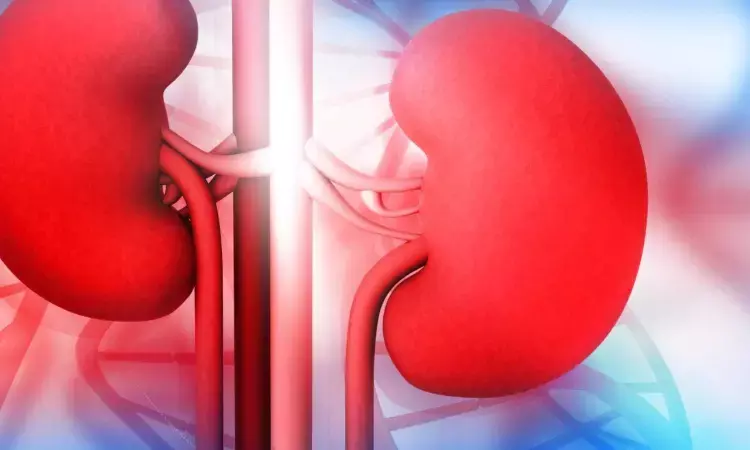- Home
- Medical news & Guidelines
- Anesthesiology
- Cardiology and CTVS
- Critical Care
- Dentistry
- Dermatology
- Diabetes and Endocrinology
- ENT
- Gastroenterology
- Medicine
- Nephrology
- Neurology
- Obstretics-Gynaecology
- Oncology
- Ophthalmology
- Orthopaedics
- Pediatrics-Neonatology
- Psychiatry
- Pulmonology
- Radiology
- Surgery
- Urology
- Laboratory Medicine
- Diet
- Nursing
- Paramedical
- Physiotherapy
- Health news
- Fact Check
- Bone Health Fact Check
- Brain Health Fact Check
- Cancer Related Fact Check
- Child Care Fact Check
- Dental and oral health fact check
- Diabetes and metabolic health fact check
- Diet and Nutrition Fact Check
- Eye and ENT Care Fact Check
- Fitness fact check
- Gut health fact check
- Heart health fact check
- Kidney health fact check
- Medical education fact check
- Men's health fact check
- Respiratory fact check
- Skin and hair care fact check
- Vaccine and Immunization fact check
- Women's health fact check
- AYUSH
- State News
- Andaman and Nicobar Islands
- Andhra Pradesh
- Arunachal Pradesh
- Assam
- Bihar
- Chandigarh
- Chattisgarh
- Dadra and Nagar Haveli
- Daman and Diu
- Delhi
- Goa
- Gujarat
- Haryana
- Himachal Pradesh
- Jammu & Kashmir
- Jharkhand
- Karnataka
- Kerala
- Ladakh
- Lakshadweep
- Madhya Pradesh
- Maharashtra
- Manipur
- Meghalaya
- Mizoram
- Nagaland
- Odisha
- Puducherry
- Punjab
- Rajasthan
- Sikkim
- Tamil Nadu
- Telangana
- Tripura
- Uttar Pradesh
- Uttrakhand
- West Bengal
- Medical Education
- Industry
Acute kidney injury not associated with worsening kidney function in persons with CKD

Researchers from the University of California, San Francisco and colleagues conducted a study to determine whether AKI is independently associated with subsequent kidney function trajectory among patients with chronic kidney disease (CKD). The findings suggest kidney disease observed after AKI often present before injury.
In the present study of hospitalized persons with chronic kidney disease (CKD) fournd that acute kidney injury (AKI) did not predict worsening of kidney function trajectory once difference in pre-hospitalization characteristically were fully accounted for. Instead, the authors suggest that much of determinants of faster kidney disease decline observed after AKI may already be present before AKI. The findings are published in Annals of Internal Medicine.
Many now believe that AKI is an independent risk factor for accelerated loss of kidney function. This has led to changes in research focus, practice patterns, and public health targets. However, prior studies associating AKI with more rapid subsequent loss of kidney function had methodological limitations, including inadequate control for differences between patients who had AKI and those who did not.
The Researchers in the Chronic Renal InsufficieAnnals of Internal Medicinency Cohort (CRIC study) analyzed data from 3,150 persons with CKD to determine whether AKI is independently associated with subsequent kidney function trajectory. The data showed 612 AKIs in 433 persons with CKD over a median follow-up of 3.9 years. After adjusting for patient characteristics, such as prehospitalization estimated glomerular filtration rate (eGFR) slope and level of proteinuria, AKI did not predict worsening of subsequent kidney function trajectory. Instead, the authors highlight that their results show that much of the kidney disease observed after AKI may already be present before AKI. They recommend that clinicians instead focus on flattening the eGFR slope and treating proteinuria. The authors do acknowledge that a diagnosis of AKI does present an opportunity to identify high-risk patients and implement evidence-based interventions to slow CKD progression.
Reference:
Anthony N. Muiru, Jesse Y. Hsu, Xiaoming Zhang, Lawrence J. Appel, Jing Chen, Debbie L. Cohen, Paul E. Drawz, Barry I. Freedman, Raymond K. Hsu, James P. Lash, Kathleen D. Liu, Ian E. McCoy, Anna Porter, Panduranga Rao, Ana C. Ricardo, Hernan Rincon-Choles, James Sondheimer, Jonathan Taliercio, https://doi.org/10.7326/M22-361.
Dr Kamal Kant Kohli-MBBS, DTCD- a chest specialist with more than 30 years of practice and a flair for writing clinical articles, Dr Kamal Kant Kohli joined Medical Dialogues as a Chief Editor of Medical News. Besides writing articles, as an editor, he proofreads and verifies all the medical content published on Medical Dialogues including those coming from journals, studies,medical conferences,guidelines etc. Email: drkohli@medicaldialogues.in. Contact no. 011-43720751


